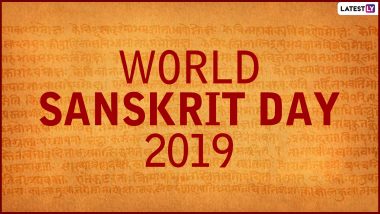August 15 marks a very important day for India, its Independence Day. But other than celebrating the freedom, it also celebrates a very ancient emergence from this land, the language of Sanskrit. To celebrate this language, World Sanskrit Day 2019 is marked on August 15 this year. A language from India that emerged 3,500 years ago, it is the predominant language of principal texts of Buddhism and Jainism. This day is also known as Sanskrit Diwas. This classical language is highly respected all over the world today. On Sanskrit Diwas 2019, we let you know more about the history, significance and some facts about the language.
Sanskrit Diwas Date
The celebration of Sanskrit Diwas is held on Shraavanapoornima, that is the Poornima day of the holy Hindu calendar month of Shravan. Since this year, August 15 is the day of Shravan Purnima, Sanksrit Day is being celebrated today.
History and Significance
The first celebrations of World Sanskrit Day or Sanskrit Diwas were in the year 1969. Several events and seminars were held highlighting the importance of the language and in turn promote its usage. The language has such rich attributes to the country that it deserves to be learnt and passed on to the newer generations. Several folk tales, learnings, religious texts have been written down in Sanskrit which makes it a significant language.
Sanskrit is one of the oldest documented members in the Indo-European family of languages. It is said to have relations to Greek, Latin as well as some other extinct languages with historical significance to Europe, West Asia, Central Asia and South Asia. The celebrations of Sanskrit Diwas is promoted by Samskrita Bharati, a non-profit organisation that works to revive the classical language.
The word Sanskrit is composed of two words sam meaning together, perfected and krta meaning made, formed. So it refers to a work that has been "well prepared, pure and perfect, polished, sacred". The Sanskrit language has originated 3500 years ago and is also known as Dev Vani (language of the Gods). Popular belief states that it was Lord Brahma who passed on his knowledge to the learned sages in the heavenly abode, who then shared it with the earthly learned scholars. The written form of the Sanskrit language traces back to 2nd century BC in the form of Vedic literature. The language has migrated from Southeast Asia and Central Asia, to become a language of the high culture and a symbol of the elite.
(The above story first appeared on LatestLY on Aug 15, 2019 02:56 PM IST. For more news and updates on politics, world, sports, entertainment and lifestyle, log on to our website latestly.com).













 Quickly
Quickly


